2015年新编人教版英语七年级下册导学案Unit 4 Don’t eat in class第3课时Section B(1a-1d)
7七年级下册英语人教版Unit 4 Don’t eat in class导学案
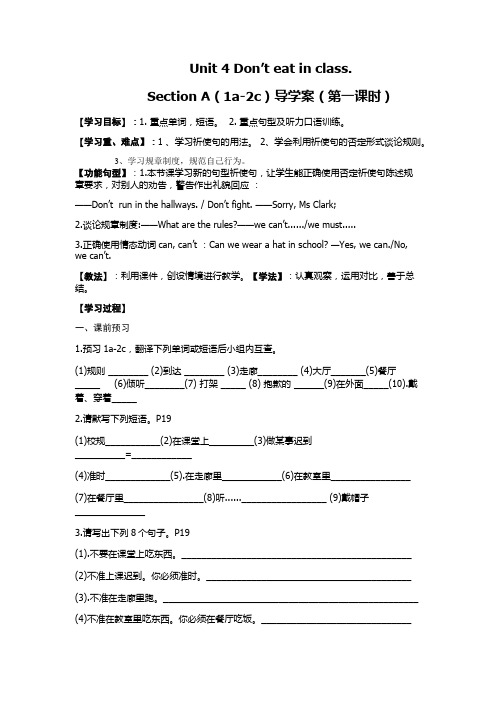
Unit 4 Don’t eat in class.Section A(1a-2c)导学案(第一课时)【学习目标】:1. 重点单词,短语。
2. 重点句型及听力口语训练。
【学习重、难点】:1 、学习祈使句的用法。
2、学会利用祈使句的否定形式谈论规则。
3、学习规章制度,规范自己行为。
【功能句型】:1.本节课学习新的句型祈使句,让学生能正确使用否定祈使句陈述规章要求,对别人的劝告,警告作出礼貌回应:——Don’t run in the hallways. / Don’t fight. ——Sorry, Ms Clark;2.谈论规章制度:——What are the rules?——we can’t....../we must.....3.正确使用情态动词c an, can’t :Can we wear a hat in school? —Yes, we can./No,we can’t.【教法】:利用课件,创设情境进行教学。
【学法】:认真观察,运用对比,善于总结。
【学习过程】一、课前预习1.预习1a-2c,翻译下列单词或短语后小组内互查。
(1)规则 ________ (2)到达 ________ (3)走廊________ (4)大厅_______(5)餐厅_____ (6)倾听________(7) 打架 _____ (8) 抱歉的 ______(9)在外面_____(10).戴着、穿着_____2.请默写下列短语。
P19(1)校规___________(2)在课堂上_________(3)做某事迟到__________=____________(4)准时_____________(5).在走廊里____________(6)在教室里________________ (7)在餐厅里________________(8)听......_________________ (9)戴帽子______________3.请写出下列8个句子。
人教版七年级英语下册导学案 Unit4 Don’t eat in class. (2)
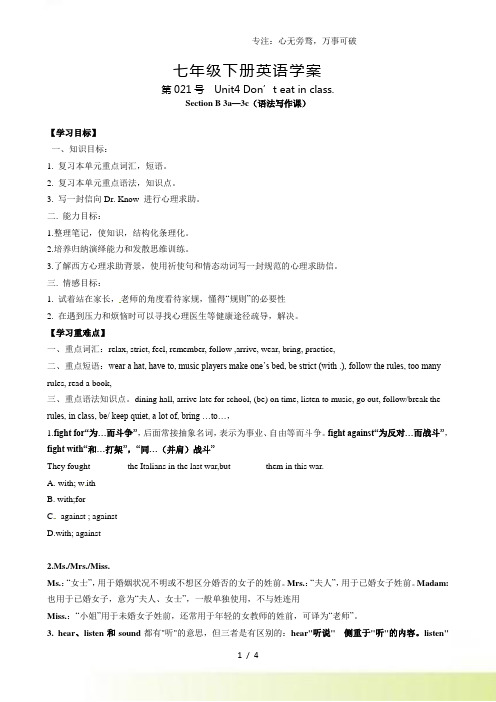
七年级下册英语学案第021号Unit4 Don’t eat in class.Section B 3a—3c(语法写作课)【学习目标】一、知识目标:1. 复习本单元重点词汇,短语。
2. 复习本单元重点语法,知识点。
3. 写一封信向Dr. Know 进行心理求助。
二. 能力目标:1.整理笔记,使知识,结构化条理化。
2.培养归纳演绎能力和发散思维训练。
3.了解西方心理求助背景,使用祈使句和情态动词写一封规范的心理求助信。
三. 情感目标:1. 试着站在家长,老师的角度看待家规,懂得“规则”的必要性2. 在遇到压力和烦恼时可以寻找心理医生等健康途径疏导,解决。
【学习重难点】一、重点词汇:relax, strict, feel, remember, follow ,arrive, wear, bring, practice,二、重点短语:wear a hat, have to, music players make one’s bed, be strict (with .), follow the rules, too many rules, read a book,三、重点语法知识点。
dining hall, arrive late for school, (be) on time, listen to music, go out, follow/break the rules, in class, be/ keep quiet, a lot of, bring …to…,1.fight for“为…而斗争”,后面常接抽象名词,表示为事业、自由等而斗争。
fight against“为反对…而战斗”,fight with“和…打架”,“同…(并肩)战斗”They fought ________the Italians in the last war,but________them in this war.A.with; w ithB. with;forC.against ; againstD.with; against2.Ms./Mrs./Miss.Ms.:“女士”,用于婚姻状况不明或不想区分婚否的女子的姓前。
人教版七年级下册英语导学案Unit 4 Dont eat in class

Unit 4 Don't eat in class ..Period 1(Section A 1a~2c)课前诊断自主学习一.温故知新预习课本P19~P20,找出其中的短语和重要句型。
1. 不要再走廊里跑2. 不要上课迟到3. 不要在课堂上吃东西4. 不要在教室里或走廊里听音乐5. 不要打架6. 戴帽子7. 在餐厅吃饭8. 你校的校规是什么?二.设问导读Task 1 Free talkWhat school rules do you know?Task 2 Look at 1a and make dialogues.A:What are the rules ?B:Well ,we can't ……Task 3ListeningListen to 1b, and number after the names .Listen again and fill in the blanks .Ms Clark: Hey, Peter. You know the_____. _______________________.Peter: Sorry, Ms Clark.Mr. Smith: Amy,________________ ___________________________.Amy: Oh, sorry, Mr. Smith.Mr. Smith: Hey, Mike. _________ .____________, Mike!Boy 1: He_____ hear you, Mr Smith1.Before listeningGroup workWhat can you ... in the classroom?What can't you ... in the classroom?2.While listeningListen and finish 2aListen again and finish 2b.3. After listeningCindy is telling Alan the school rules:We____ listen to music in the classroom or________. But we ____listen to it outside or in the music room. And we can't ___in the classroom, but we can eat inthe_________. We can't _______________or________ our classmates. That ______ the teachers really unhappy.三.自学检测Pairwork.Student A is Alan and Student B is Cindy. According to the information in 2a and 2b, talk about school rules like this:A: Can we listen to music, Cindy?B: We can't listen to music in the classroom or hallways, but we can listen to it outside.互动学习问题解决1.Sit down.2.e in.3.Eat at home.4.Listen to music outside.5. Do your homework at school.6.Don't run in the hallways这些句子是________句. 表示请求、命令等的句子.通常以_________开头。
人教版七年级英语下册Unit4 Don't eat in class导学案
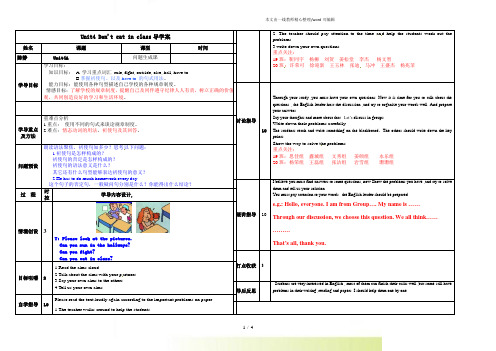
姓名课题课型时间陈静Unit4A 问题生成课学导目标学习目标:知识目标: A 学习重点词汇rule, fight, outside, else, hall, have toB掌握祈使句、以及have to 的句式用法。
能力目标:能使用各种句型描述自己学校的各种规章制度。
情感目标:了解学校的规章制度,提醒自己及同伴遵守纪律人人有责,树立正确的价值观,共同创造良好的学习和生活环境。
学导重点及方法重难点分析1.重点:使用不同的句式来谈论规章制度。
2.难点:情态动词的用法,祈使句及其回答。
问题预设朗读语法聚焦,祈使句知多少?思考以下问题:1.祈使句是怎样构成的?祈使句的否定是怎样构成的?祈使句的语法意义是什么?其它还有什么句型能够表达祈使句的意义?2.He has to do much homework every day.这个句子的否定句,一般疑问句分别是什么?你能得出什么结论?过程时控学导内容设计,情境创设3T: Please look at the pictures.Can you run in the hallways?Can you fight?Can you eat in class?目标咀嚼 2 1.Read the aims aloud.2.Talk about the aims with your p artners.3.Say your own aims to the others.4.Tell us your own aims自学指导10Please read the text loudly again according to the important problems on paper.1.The teacher walks around to help the students.problems3.write down your own questions ..重点关注:19班:靳同宇杨柳刘贺姜松堂李杰杨文智20班:许荣可徐迎新王玉林张迪马冲王盛杰杨兆菲讨论指导10Through your study ,you must have your own questions. Now it is time for you to talk about thequestions , the English leader host the discussion ,and try to organize your words well. And prepareyour answersSay your thoughts and more about that . Let’s discuss in groups.Write down their problems carefully.The students teach and write something on the blackboard。
新人教版七下英语集智备课导学案 Unit 4 Don’t eat in class 4
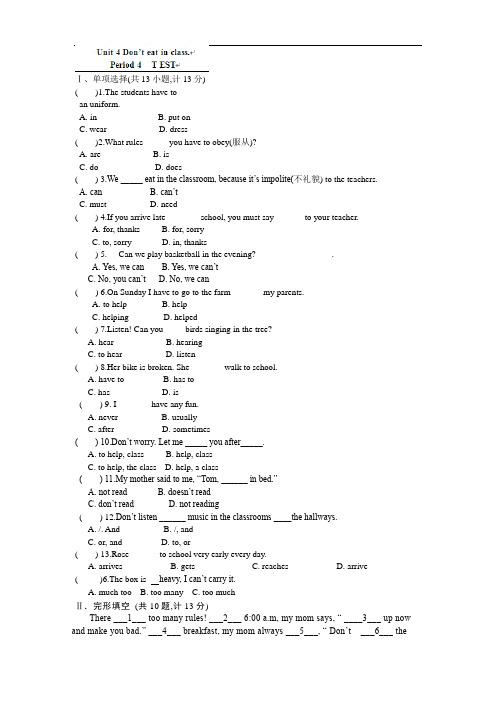
Ⅰ、单项选择(共13小题,计13分)( )1.The students have to _______an uniform.A. inB. put onC. wearD. dress( )2.What rules _____ you have to obey(服从)?A. areB. isC. doD. does( ) 3.We _____ eat in the classroom, because it’s impolite(不礼貌) to the teachers.A. canB. can’tC. mustD. need( ) 4.If you arrive late _______ school, you must say ______ to your teacher.A. for, thanksB. for, sorryC. to, sorryD. in, thanks( ) 5.----Can we play basketball in the evening?-----______________.A. Yes, we canB. Yes, we can’tC. No, you can’tD. No, we can( ) 6.On Sunday I have to go to the farm_______ my parents.A. to helpB. helpC. helpingD. helped( ) 7.Listen! Can you ____ birds singing in the tree?A. hearB. hearingC. to hearD. listen( ) 8.Her bike is broken. She _______ walk to school.A. have toB. has toC. hasD. is( ) 9. I _______ have any fun.A. neverB. usuallyC. afterD. sometimes( ) 10.Don’t worry. Let me _____ you after_____.A. to help, classB. help, classC. to help, the classD. help, a class( ) 11.My mother said to me, “Tom, ______ in bed.”A. not readB. doesn’t readC. don’t readD. not reading( ) 12.Don’t listen ______ music in the classrooms ____the hallways.A. /. AndB. /, andC. or, andD. to, or( ) 13.Rose ______ to school very early every day.A. arrivesB. getsC. reachesD. arrive( )6.The box is heavy, I can’t carry it.A. much tooB. too manyC. too muchⅡ.完形填空(共10题,计13分)There ___1___ too many rules! ___2___ 6:00 a.m, my mom says, “ ____3___ up now and make you bad.” ___4___ breakfast, my mom always ___5___, “ Don’t ___6___ thedirty dishes in the ___7___!” After that, I ___8___ to school because I can’t be late. At school, we have more rules —don’t be ___9___, don’t ___10___in class,…( ) 1. A. is B. areC. haveD. has( ) 2. A. in B. onC. atD. under( ) 3. A. Get B. getC. getsD. got( ) 4. A. At B. AfterC. onD.in( ) 5. A. says B. sayC. saidD. will say( ) 6. A. leave B. leftC. liveD. life( ) 7. A. bedroom B. kitchenC. roomsD. living room( ) 8. A. go B. walkC. runD. rum( ) 9. A. noise B. noisyC. noseD. sound( ) 10.A. eats B. eatC. ateD. to eat。
2015年春七年级英语下册 Unit 4 Don’t eat in class教案 (新版)人教新目标版

Unit4 Don’t eat in class.Ⅰ. Analysis of the Teaching Material1.Status and FunctionIn this unit students learn to talk about school and family rules.Such a topic is so familiar to students that they must be active in all the activities in class.It is h elpful to raise learning interest and useful to improve students’ listening,speaking,reading and writing skills.(1)The first period introduces some negative imperatives first.Then students are provided with much listening and oral practice using the targe t language “What are the rules?”(2)In the second period students do much listening and oral practice using the words “can” and “can’t”.After this class,students know mo re about what they can or can’t do at school.(3)The third period provides students with much oral practice using the phrase “have to”.And the game in the last part is useful to raise learning interest.It is useful to improve spoken English.(4)In the fourth period students learn to talk about what they do or don’t have to do at home.(5)In the fifth period students learn to write a letter to talk about their family rules.And they also learn to talk about some common signs.All the activities are desi gned to improve students’ rea ding and writing skills.(6)The self check in the last period is designed to give students more reinforced practice,especially writing practice.In this way,students better understand how to apply what they have learned in their daily life.2.Teaching Aims and Demands(1)Knowledge ObjectsIn this unit students learn to talk about rules.Make students learn and grasp imperatives and the usage of the words “can” and “have to”.(2)Ability ObjectsTrain students’ listening,speaking,reading and writing skills.Train students’ integrating skills.(3)Moral ObjectAs students,we must obey school rules.3.Teaching Key PointsLearn the key vocabulary and the target language. Learn the imperatives and thewords “can” and “have to”.4.Teaching DifficultiesTrain students’ listening,speaking,reading and writing skills. Learn to wri tea letter.5.Studying WaysTeach students how to talk about rules in daily life.Ⅱ.Teaching Guidancenguage Function: Talk about rules.2.Target Languages:Don’t eat in class! Can we wear hats? No,we can’t. Wedon’t have to wear a school uniform.3.StructuresImperatives. Can for permission. Modal have to.4.Key Vocabularyin class, classroom, hallway, gym, arrive,hate,go out, practice, inside,outside, uniform, sports shoes,fight,can,can’t,have to5.Learning Strategies: Scanning. Deducing.Ⅲ. Periods: Six periods.Period 1 (Section A: 1a-2d)Step 1 Revision Review some key words and language points learned in Unit 11 briefly. 1 2 345学校走廊Point to the pictures one by one and teach students to say,Don’t arrive late for class.Don’t run in the hallways.Don’t eat in the classrooms.Don’t listen to music in the classrooms.Don’t fight.Write the rules on the blackboard.Read and have students repeat several times.Students open their books. Point out the list of school rules.Invite a different student to read each rule to the class.Step 2 Call students’ attention to the picture.Say, Each of these students is breaking one of these rules.Write the number of the rule each student is breaking in the box next to him or her.Point out the sa mple answer.Students do the activity individually.Check the answers.Answers 1.boy looking at his watch2.boy running in the hallway3.girl eating an apple4.boy with headphones5.boys sitting at desks,fightingStep 3 1bAsk students to read the five rules in activity 1a once more.Point to the three names.Say,You are to listen to a conversation.Three students are breaking the rules.Listen and write the number of the rules next to the name of the student who is breaking the rules.Play the recording for the first time.Students only listen.Play the recording again.This students listen and fill in the number of the rule after each name.Correct the answers.Answers Peter:2 Nicki:3 Joseph:4Step 4 1cInvite a pair of students to read the sample conversation to the class.Write it on the blackboard.Put students into pairs.Say,Student A is an exchange student.He or she doesn’t know the rules in the school.Student B tells him or her about the rules in 1a.Get students to work in pairs.As they are working,move around the room offering help as needed.Get some pairs of students to present their conversation to the class.(This activity provides oral practice using the target language.)Step 5 SummaryIn this class we’ve mainly learned to talk about school rules. As students, we must obey school rules.Step Ⅵ HomeworkWrite down the rules in activity 1a without looking at books.Step 6 Blackboard DesignReflection after class:______________________________________________________________________________ ______________________________________________________________________________ ______________________________________________________________________________ _____Period 2 (section A: 3a,3b,3c)Step1 RevisionT: Hello. What day is it today? What’s the weather like today?T: It is a good day today. Can we play pingpong outside?Can we run outside/in the hallways? Can we fight in the classrooms?Can we e at an apple in a dining hall? Do you like movies?Do you want to goto a mo vie?Today we are going to watch a short play about rules. It is made by our classmates. When you are watching the play, you should to remember what rules they are breaking. Use the sentence like : Don’t …S1: Don’t arrive late for school. S2: Don’t talk in class.S3: Don’t listen to music in class.Step 2 PresentationT: Excuse me. What time does the school begin in the morning?S: It begins at …T: Yeh, so I have to arrive at school at ….What about you?What time do you have to arrive at school in the morning?S: I have to arrive at school at…T: As students, what do you have to do in the school?S: We can’t listen to … eat in class. fight. …T: What can you do at home?S: I can play computer/watch TV/sleep/talk/…at home.Step 3 Task 1: tell the reasonT: Where do you like to stay, at home or at school? Now I’ll give you 2 minutes to prepare for it.S: At school, I can….. I don’t have to ….At home, I can’t …. I have to…Step4 Ask and answerDo you have to get up at 6:oo?Can you watch TV on weekdays?Do you have to wash your clothes?Can you go out at night?T: Now , look at the list. These are family rules. Please ask and answer with your partner and fill in the list. Then I will ask some of you to report this list. Step 5 3aT: As you know, we have seven classes in a day. What can you do in an English class? S: We can speak English/learn English songs/…T: What can you do in the painting class?S: We can draw some pictures..T: What do you have to bring for the painting class?S: We have to bring our color pencils.T: What can you do in the PE class? Or we can say, what can you do in gym class?Step6 Task2: Design your ideal schoolT: As you are students, you have to obey the rules. Now if you have the chance tobe a headmaster, what kind of school do you want to make? Please tell us the rulesof your ideal school.You can work with your group, ask and answer like:A: Can the students….?B: Yes, they can. / No, they can’t.Report: In our school, the students can … They can’t …. They have to …. They don’t have to…. Do you like our school?Step 7 Homework:1) Copy new words. 2) Design your ideal school and write down the rulesStep 8 Bb designReflection after class:_________________________________________________________________________________________________________________________________________________________________________________________________________________________________________Period 3 (section B: 1a-2c)Step 1 Warming-up and revisionSing some English songs. Greet the class as usual.T: Good morning/afternoon! How are you? What’s the date today?What day is it today? What’s the weather like today? Are you happy?Learn the song “If you’re happy.”T: I’m very happy today, do you know? Please guess!Step 2 ReadingPresent the photos of Emily and Dave on Page 74(They are laughing) and ask: T: Are you happy? Why?Revise Part 1 in Section B. Then show the photo of Zhao Pei in3a. Ask: Is she happy? Let Ss read the letter and find out the answers. After that, ask Ss make a list about her rules .T: What can you do at your house and what can’t you do in your house? (Get different answers from Ss.)Step 3 Class Survey1. Make a list of the rules at your houses.T: OK! There are so many rules in your houses! Now make a list of the rules at your houses. You can use Zhao Pei's list of rules as a model.Give the Ss some minutes to write. And then have some students read their lists to the class. Make language corrections as needed.2. Make a surveyFirst, point out the sample question and answer in the picture in the book. Ask two students to read it to the class.Step 4 Task2 Make the rules for school libraryT: As you are Ss, you have to obey many rules. Now if your headmaster asks you to help him make a rule for your school library, can you help him? What kind of rules do you want to make? Please tell us the rules. Work in groups. Then make a report.T: You are all good Ss. I hope you can be Ss both at home and at school. Bea good student.Step 6 HomeworkDo the exercises in the exercise books.教学反思:Period 4 (Section B: 3a-self check)Step 1 Warming-up and revi sion1. Greetings.2. Enjoy English songs.3. T: Are you happy? Ask some Ss to say the rules in their house.Step 2 Look and practiceT: Most of us have many rules in our house. What about the Jones family? Are there too many rules in his house? Look at the pictures and ask and answer in pairs like this:S1: Do you have to….?S2: Yes, I do./ No, I don’t.Ss practice in pairs and act out. Then show a list and let Ss make the list. Step 3 WriteT: Jones is very unhappy. H e wants to write a letter to Dr Know about the rules in his house. Imagine you are J ones, do it!Ss do this job. Then show some and enjoy their ideas.Step 4 ExplanationRevise the whole unit, and explain some important phases in class. And solve the problems the Ss have.Step 5 ExercisesDo some exercises in class and check the answers.Step 6 Home work1. Finish the exercises in Book 1-2.2. Write a letter to your pen pal and tell her /him the rules of your school or your family.教学反思:_______________________________________________________________________________ _______________________________________________________________________________ _______________________________________________________________________________。
2015七年级下册Unit4导学案

Unit 4 Don’t eat in class.(第一课时)Section A (1a-1c)教学目标 1.知识目标: 学习用祈使句谈论校园规则2.技能目标: 学会用Don’t…和情态动词can、can’t、must、have to谈论校园规则。
3.情感目标: 学会自觉遵守校规校纪,对校规校纪提出合理建议。
教学重点否定祈使句Don’t…和情态动词can、can’t、must、have to的用法以及有关校规的各种表达。
教学难点学习用用Don’t…和情态动词can、can’t、must、have to谈论校园规则。
学习过程一、预习与交流A、预习课本p19,找出其中的短语和重要句型。
B、你能用英语读出下列单词和短语吗?并试着写下来(1) 在课堂上___________ (2) 起床__________ (3)按时_______ _____(4) 在餐厅里_____________ (5) 在走廊里(6) 听音乐(7)穿衣____ ____ (8)上课迟到(9)校规C、你能通过预习说出下面的句子吗?并试着写下来1、不要在教室里吃东西。
2、我们一定要按时。
3、你不能和他打架。
二、合作与探究1.复习、回顾Let’s…的祈使句的使用和情态动词can/ can’t 的用法。
2.学习否定祈使句Don’t… 的结构和用法。
3.学习本课时单词及相关短语,阅读课本1a,试着拟定本组组规。
4. 小组宣读本组组规。
5.完成课本1b听力,听力时重点在违反的规定。
6.照例子完成1c对话练习。
(两人一组,一问一答)7. Summary and Self-examination (小结与反思)词汇:句型:三、点拨升华1. arrive late for= be late for 做某事迟到。
arrive late for侧重到达的时间晚,be late for侧重于状态。
Don’t arrive late for the meeting next time.= Don’t be late for the meeting next time 下次开会别迟到1)arrive―到达‖, 表达―到达某地‖arrive in +city/ country(大地点)at + town/station(小地点)用in / at填空。
2015年新编人教版英语七年级下册导学案Unit 4 Don’t eat in class第2课时Section A(2d-3c)

Unit 4 Don’t eat in class.第二课时Section A(2d-3c)【教师寄语】Diligence is the mother of success.【Free talk】Talk about how you should not do at school or at home.【Learning tasks】1. 学习have to谈论规则的用法,谈论家规。
2. 学会对家规提出合理化建议,学会与家长沟通。
【Importance and difficulties】have to的用法;有关家规和校规的表达。
【学习过程】一、超前预习I. 请试着写出下列短语。
1.在外面听音乐2.在音乐室听音乐3.在走廊里听音乐4.在教室里吃东西5.在餐厅里吃东西6.在外面吃东西7.打扫教室8.穿制服9.穿运动鞋II. 你能通过预习说出下的句子吗?1) —我们在校必须穿校服吗?—是的。
2) 你必须穿运动鞋上体育课。
3) 你们必须做别的什么事?4) 上学时,晚上不要外出。
5) 放学后不准看电视。
6) 放学后我必须做功课。
7)每天练习弹吉他。
Ⅲ. 找出你的疑惑:_____________________________________________________________二、课中学习I. 预习检测II. 解决疑惑自主互助学习知识剖析:1. 情态动词have to 的用法,意思是"必须、不得不",它侧重于客观上的必要和外界的权威。
(1)结构:主语+have to+动词原形+其他(一般现在时,主语是第三人称单数时,用has to;句子是过去时,用had to.)如:We have to wear sneakers for gym class. 在体育课上,我们必须穿运动鞋。
Tom has to practice the guitar every day. 汤姆每天必须练习弹吉它。
人教版七年级英语下册教案 Unit 4 Don't eat in class Unit 4 单元导学
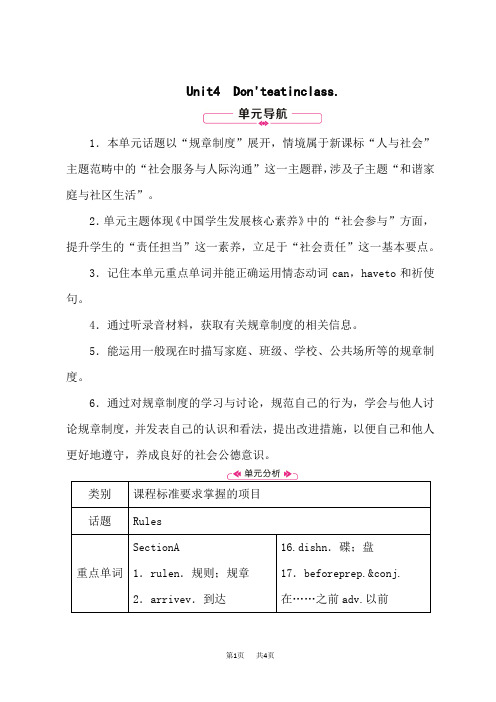
Unit4 Don'teatinclass.
1.本单元话题以“规章制度”展开,情境属于新课标“人与社会”主题范畴中的“社会服务与人际沟通”这一主题群,涉及子主题“和谐家庭与社区生活”。
2.单元主题体现《中国学生发展核心素养》中的“社会参与”方面,提升学生的“责任担当”这一素养,立足于“社会责任”这一基本要点。
3.记住本单元重点单词并能正确运用情态动词can ,haveto 和祈使句。
4.通过听录音材料,获取有关规章制度的相关信息。
5.能运用一般现在时描写家庭、班级、学校、公共场所等的规章制度。
6.通过对规章制度的学习与讨论,规范自己的行为,学会与他人讨论规章制度,并发表自己的认识和看法,提出改进措施,以便自己和他人更好地遵守,养成良好的社会公德意识。
续表
【课时建议】本单元建议5课时
SectionA(1a-1c)(一课时)
SectionA(2a-2d)(一课时)
SectionA(GrammarFocus-3c)(一课时)
SectionB(1a-1d)(一课时)
SectionB(2a-SelfCheck)(一课时)
词汇短语:主要采用图片及多媒体展示助记法。
基本句子:采用多媒体展示及交际法(利用多媒体展示两人进行交际时的情景)。
语法:主要通过交际、练习让学生掌握如何对规则进行问答。
人教版七年级英语下册Unit4 Don’t eat in class!导学案

七年级下册Unit4 Don’t eat in class!导学案Section A班级:姓名:时间:年月日【学习目标】1、掌握10个单词:rule arrive be on time hallway hall dining listen listen tofight sorry outside2、掌握并灵活运用句型:What are the rules ?Don’t do sth. We can(not) do sth We must do/be【学习重难点】1. 祈使句的肯定形式与否定形式2. 句型:What are the rules ? Don’t do sth.We can(not) do sth We must do/be)【预习指导】写出并读出下列单词和短语:1.校规2.迟到3.听音乐4.和他打架5.在走廊里6.在课堂上7.准时 8.在教室里预习课本p19,找出其中的短语和重要句型1 、不要在走廊里跑______________________2、不要上课迟到___________________________3、不要在教室里吃东西___________________4、不要在教室里或走廊里听音乐_____________5、不要打架______________6、你校的规则是什么?________________【合作探究】语法(祈使句)1.)含义:祈使句是用来表示请求、命令、叮嘱、号召或者劝告等的句子,这类句子的主语常是第二人称you,也就是听话者,因而you常省去2.)注意:祈使句的开头是动词原形。
如:过来!快起床!3.)祈使句的否定形式多以do not(常缩写成don't)开头,再加上动词原形。
如:别看电视!别打架!不要说话!学习成果展示一、根据汉语意思完成句子。
1、我们必须准时到校。
We ________ get to school ________ ________.2、不要在走廊上奔跑。
新人教版 英语 七年级下册 unit4 Don’t eat in class 导学案

中学组英语学案周次日期制定教师课题名称Unit 4 part2课型New课时1学习目标 1.学会朗读、运用本部分的单词与词组。
important ;bring;player;have to; school uniform; be quiet;2.学会在不同的场景下用英语谈论身边的“rules”.3.运用语法:情态动词can(can’t)/must、have to与祈使句的运用重点难点 1.复习运用祈使句。
2.难点是情态动词have to的运用。
学习方法自主学习、小组合作、查阅资料学习过程一、预习导学记忆搜索,温故知新1.自由会话What are the rules in our school? We can’t …Don’t …We must…朗读并识记本节课掌握的单词和短语important______bring_______;player_______;have to______; school uniform________; be quiet__________;be on time________阅读文本,学会理解与记忆1.Read and find the rules in John’s new school.1)2)3)4)5)二、教师引领,小组合作展示Pairwork:A:What are some of the rules in yourschool?B:well,there are a lot of rules…A:Can you …B:A:Do you have to wear the schooluniform?B:A:…参考词汇:Wear a hatBe quiet in the dining hallBring music players to schoolBe late for school…1.Read in pairs.2.Role –play the conversations in pairs.3.Make up a similar conversation,then show it to the class.三、质疑问难四、巩固提高3a.Write the rules for the school library.e the words to make questions about the rules. Then write answers according to your school.3c. Make up five cool rules for your dream school. Share your rules with the class. Your classmates vote for the Coolest School!五、盘点收获•向全班同学介绍本节课中你的收获。
新人教版 英语 七年级下册 unit4 Dont eat in class 导学案

新人教版英语七年级下册 unit4 Dont eat in class 导学案Unit4 Don’t eat in class活动导学案Period1 (Section A 1a-----2d)【学习目标】1. 本节课主要学习:通过体验和谈论规章制度,从而规范自己的言行,以谈论有关学校各项规章制度为话题,初步感受祈使句,以及如何表达规则。
2.掌握下列词汇.(1)会拼读和运用下列单词: rule, hallway, hall, dining, listen ,listen to,fight ,sorry, outside, wear, important, bring, uniform, quiet (2)能熟练运用下列短语:(be/arrive) late for , be on time, in the hallway, in the dining room,listen to, bring…to, be quiet, have to, wear the school uniform (3)掌握下列句型:Don’t arrive late for class . You must be on time. We can’t arrivelate for class. We always have to wear the school uniform. 3. 重点难点:用祈使句来描述规则【导学自习】 1. 看单词表,拼读下列单词,并注明音标和汉语意思。
1)rule/ / _________ 2)hallway/ /_________3)hall/ / ________ 4)dining/ /__________ 5)listen//__________6)fight / /________ 7)sorry/ /__________8)outside//_________9) wear/ /_________ 10)important/ /__________11)bring/ /__________12)uniform/ /_____________13)quiet/ /___________2.学生预习P19,找出的重点短语、句型、难点。
人教版七年级下册Unit 4 Don't eat in class 导学案3
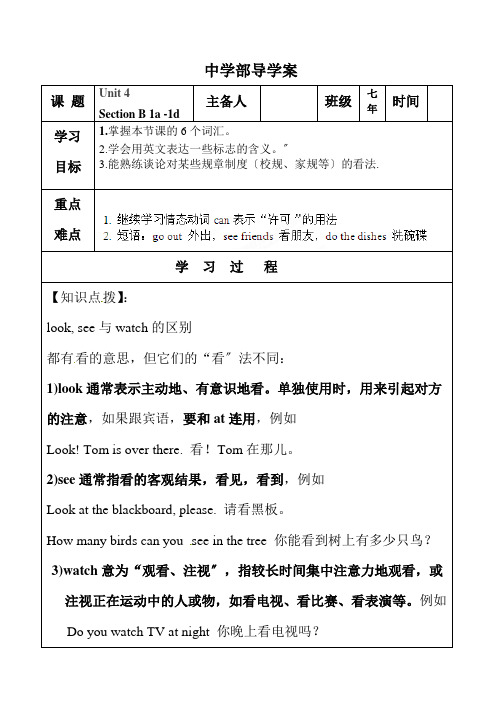
中学部导学案课题Unit 4Section B 1a -1d 主备人班级七年时间[来源:学。
科。
网Z。
X。
X。
K]学习目标1.掌握本节课的6个词汇。
2.学会用英文表达一些标志的含义。
〞3.能熟练谈论对某些规章制度〔校规、家规等〕的看法.重点难点学习过程【知识点拨】:look, see与watch的区别都有看的意思,但它们的“看〞法不同:1)look通常表示主动地、有意识地看。
单独使用时,用来引起对方的注意,如果跟宾语,要和at连用,例如Look! Tom is over there. 看!Tom在那儿。
2)see通常指看的客观结果,看见,看到,例如Look at the blackboard, please. 请看黑板。
How many birds can you see in the tree 你能看到树上有多少只鸟?3)watch意为“观看、注视〞,指较长时间集中注意力地观看,或注视正在运动中的人或物,如看电视、看比赛、看表演等。
例如Do you watch TV at night 你晚上看电视吗?一、自主学习:1.外出_____________________2. 看朋友__________________3. 做家庭作______________4. 练习吉他__________________5.洗碗___________________6. 每天上午________________7.上学期间的晚上_________________ 8.晚饭前__________________9.每个星期六__________二、合作探究1、小组讨论完成1a、1b的内容。
2、听录音完成1b局部。
3、练习1c中的对话。
【课堂练习】翻译以下句子1. 放学后不许看电视。
2. 每天练习弹他。
3. 上学期间,晚上不要出去。
4 .放学后做作业。
检测过关一.用所给动词的适当形式填空。
1. She practices ___________(speak) English every day2. Liu Mei is good at _________(draw)3. The little girl helped me __________(find) the way to the school yeste rday.4. He is enjoying _________(play) the piano.5. They _________(start) the game at 8 last night.二.用方框中的此完成对话,每空一词do, watch, into, have, can’t, like , listen, clean, can, don’t[来源学+科+网]A: Do you your new schoolB: Yes. It’s a good school and there are many rules.A: Really you go out on school nights[来源学科网]B: Yes, we can. But we eat in class. And we can’t arrive late for class.A: Do you to wear uniformsB: No, we have to do that. But we have to the classroom every day. We can go the classroom withoutthe teacher. We can _______ to music outside.第二课时【学习目标】知识目标:掌握有关食物的词汇及句型:Do you like … Yes, I do./No, I don’t.能力目标:能用所学词汇及句型表达自己对某种食物的喜好,并询问他人对某种食物的好恶。
人教版七年级英语下册导学案 Unit4 Don’t eat in class
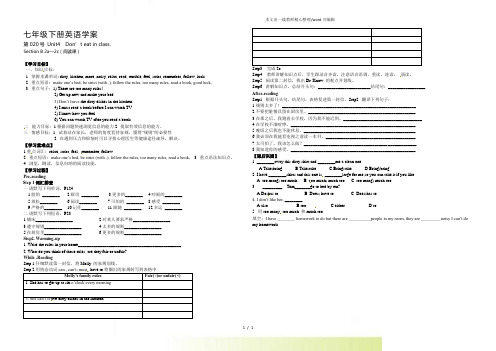
本文由一线教师精心整理/word 可编辑1 / 1 七年级下册英语学案第020号 Unit4 Don’t eat in class. Section B 2a —2c (阅读课) 【学习目标】 一、知识目标:1. 掌握本课单词: dirty, kitchen, more, noisy, relax, read, terrible, feel, strict, remember, follow, luck2. 重点短语:make one’s bed, be strict (with .), follow the rules, too many rules, read a book, good luck,3. 重点句子:1) There are too many rules! 2) Get up new and make your bed 3) Don’t leave the dirty dishes in the kitchen. 4) I must read a book before I can watch TV. 5) I know how you feel. 6) You can watch TV after you read a book. 二. 能力目标:1.根据问题快速浏览信息的能力2. 提取有效信息的能力。
三. 情感目标:1. 试着站在家长,老师的角度看待家规,懂得“规则”的必要性2. 在遇到压力和烦恼时可以寻找心理医生等健康途径疏导,解决。
【学习重难点】 1.重点词汇:relax, strict, feel, remember, follow 2. 重点短语:make one’s bed, be strict (with .), follow the rules, too many rules, read a book,3. 重点语法知识点。
4. 浏览,跳读,信息归纳的阅读技能。
人教版英语七年级下册Unit 4 Don’t eat in class(第1课时) 导学案
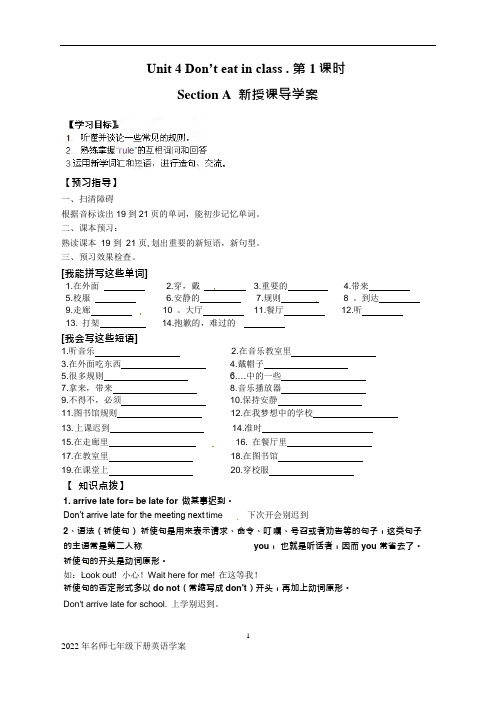
Unit 4 Don’t eat in class . 第1 课时Section A 新授课导学案【预习指导】一、扫清障碍根据音标读出19 到21 页的单词,能初步记忆单词。
二、课本预习:熟读课本19 到21 页, 划出重要的新短语,新句型。
三、预习效果检查。
[我能拼写这些单词]1.在外面2.穿,戴3.重要的4.带来5.校服6.安静的7.规则8 。
到达9.走廊10 。
大厅11.餐厅12.听13. 打架[我会写这些短语]14.抱歉的,难过的1.听音乐3.在外面吃东西5.很多规则7.拿来,带来9.不得不,必须11.图书馆规则2.在音乐教室里4.戴帽子6.…中的一些8.音乐播放器10.保持安静12.在我梦想中的学校13. 上课迟到14.准时15.在走廊里17.在教室里19.在课堂上【知识点拨】16. 在餐厅里18.在图书馆20.穿校服1. arrive late for= be late for 做某事迟到。
Don’t arrive late for the meeting next time 下次开会别迟到2、语法(祈使句)祈使句是用来表示请求、命令、叮嘱、号召或者劝告等的句子,这类句子的主语常是第二人称you,也就是听话者,因而you 常省去了。
祈使句的开头是动词原形。
如:Look out! 小心!Wait here for me! 在这等我!祈使句的否定形式多以do not(常缩写成don't)开头,再加上动词原形。
Don't arrive late for school. 上学别迟到。
3. have to 的用法,意思是"必须、不得不",它侧重于客观上的必要和外界的权威。
(1)肯定句结构:主语+have to+动词原形+其他(主语是第三人称单数时,用has to )如:We have to wear sneakers for gym class. 在体育课上,我们必须穿运动鞋。
- 1、下载文档前请自行甄别文档内容的完整性,平台不提供额外的编辑、内容补充、找答案等附加服务。
- 2、"仅部分预览"的文档,不可在线预览部分如存在完整性等问题,可反馈申请退款(可完整预览的文档不适用该条件!)。
- 3、如文档侵犯您的权益,请联系客服反馈,我们会尽快为您处理(人工客服工作时间:9:00-18:30)。
Unit 4 Don’t eat in class.第三课时Section B(1a-1d)【教师寄语】An idle youth, a needy age.【Free talk】Talk about some rules of your school.【Learning tasks】1. 掌握本部分的单词和短语。
2. 学习have to谈论规则的用法;谈论家规。
3. 能根据听力材料完成听力任务,应用所学知识进口语交际。
【Importance and difficulties】have to的用法;有关家规和校规的表达。
【学习过程】一、超前预习I. 你能用英语读出下列单词和短语吗?并试着写下来1. 看电视2. 出去3. 做作业4. 练吉他5. 看望朋友6. 清洗餐具7. 帮助他妈妈做早饭8. 在上学期间的晚上9. 在晚饭前10. 每个星期六II. 你能通过预习说出下的句子吗?1.每天练习你的吉它!____________your guitar every day.2.不要在上学的晚上外出!________ ________ _________ ________school nights. 3.放学后做作业。
_________________________________________4.放学后不要看电视。
_____________________________________Ⅲ. 找出你的疑惑:____________________________________________________________________________________________________________________________二、课中学习I. 预习检测II. 解决疑惑自主互助学习知识剖析:1. practice的用法(1)practice vt.练习,训练,其后跟名词,代词或动名词做宾语I often practice my English in the morning.我常常在早上练习英语He practices playing the piano every day. 他每天练习谈钢琴.(2) practice n.练习,实践Playing the piano needs a lot of practices.弹钢琴需要多加练习。
2. rule 在句中作名词,“规则,规定”We must obey school rules.常见的词组:follow / obey a rule 遵守规定break a rule 违反规定carry out a rule 执行规定abolish a rule 废除规定重点难点释义:1. help sb. (to) do sth. 意为:“帮助某人做某事”help 后既可接带to的不定式作宾补,也可接不带to的不定式。
如:He often helps me (to) clean the classroom.help sb. with sth. 意为“帮助某人做某事”,with后跟名词。
如:I often help him with his lessons.拓展:help oneself to --- 意为“请随便用------”, 如:Please help yourselves to some fruits.help 用作名词,表示“帮助”,是不可数名词。
如:Thanks for your help.2. 辨析:make 与do(1)联系:两者都有“做”的意思。
(2)区别:make 意为“生产,制造”,指用原材料制作成某种东西,或经过努力而做成某物。
一般强调做的东西时,用make。
如:He is making a cake.do 指进行一项经常性的或指定的活动,一般强调动作时,用do。
如:I’m doing my homework now.拓展:make the / one’s bed 整理床铺make dumplings 包饺子make a noise 制造噪音make friends 交朋友make rules 制定规则III. 学习过程:1. 完成1a 将图片与规则匹配。
2. 练习听力1b,完成相关任务。
3. 练习听力1c部分,完成相关任务。
4. 合作共建1)以小组形式归纳听力材料中的重点词组,并对重点句子进行讲解。
2)全班分角色朗读并熟读听力材料。
5. 完成1d的任务,可结合自我,谈论自己的家规。
【课堂练习】一、单项选择( ) 1. ---What are the school rules? ---We _____ arrive late for class.A. don’tB. can’tC. aren’tD. are( ) 2. _____ eat in class.A. PleaseB. Please notC. NotD. Don’t( ) 3. Please listen ___ the teacher carefully (认真).A. toB. onC. atD. of( ) 4. We don’t know Jack _____ Bruce.A. andB. orC. aboutD. of( ) 5. I like swimming, but I _____ swim.A. don’tB. amC. can’tD. not( ) 6. Don’t _____ TV after cl ass.A. watchB. watchingC. to watchD. to watching( ) 7. He often _____ English with the classmates.A. practice speakB. practices speakC. practices speakingD. practice speaking ( ) 8. Please help me _____ English.A. speakingB. to learningC. with speakD. learn二、完成句子1. 我不能放学后看望朋友。
I _______ ________ friends ________ __________.2. 我必须10点之前睡觉I _______ ________ _______in bed_______10 o’clock.3. 我不得不帮妈妈做早饭。
I ______ _______ help mom _______ ______.4. 我必须去学校练习钢琴。
I ______ ______ go to ______ _______ ______learn the piano.5. 我必须每个星期六打扫我的房间。
I ______ _ ________room ________ __. 【要点归纳】have to的用法;有关家规和校规的表达。
【拓展练习】一、单词变化1. rule(复数)_________2. out (反义词) _________3.wash(单三)__________4. get to (同义词)________5. late(反义词)________6.loud (副词)________7. could (原形)_______8. with(反义词)______9. piano(复数) _______10. snow (形容词)____二、根据句意及首字母完成单词。
1. You’d better follow the r_________.2. ________ (not fight ) with each other in the classroom.3. We can eat in the d_________ hall every day4. Don’t run in the h_________ . It’s dangerous.5. No _________(talk) in class!6. The girl often comes back early on s_________ nights.三、完成句子。
1. 不要在走廊里跑或和别人打架。
___ ____ ___ ___ or ___ ____ with others in the _____ ___.2. 杰克经常上学迟到。
Jack is often ___ __ __ __ school.3. 我们必须在体育课上穿运动鞋吗?是的。
__ ___ we ___ ___ to wear sports shoes for gym class? Yes, you _ _____.4. 每个周六我不得不去少年宫练习钢琴。
I ___ __ to ____ _ to the Summer Palace ___ __ _____ __ the piano last weekend.5. 她的工作是清洗餐具。
His job is to .【总结反思】。
